| SHADOWS ON THE WALL | REVIEWS | NEWS | FESTIVAL | AWARDS | Q&A | ABOUT | TALKBACK | |||||||||||||||||||||
 Shadows off the beaten path Shadows off the beaten pathIndies, foreigns, docs and shorts...
On this page:
THE CIVIL DEAD |
HE WENT THAT WAY |
YOU CAN'T STAY HERE
| |||||||||||||||||||||
| See also: SHADOWS FILM FESTIVAL | Last update 17.Jan.24 | |||||||||||||||||||||
|
The Civil Dead Review by Rich Cline | 
| |||||||||||||||||||||
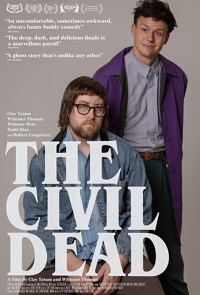 dir Clay Tatum scr Clay Tatum, Whitmer Thomas prd Kasandra Baruch, Mike Marasco, Clay Tatum, Whitmer Thomas with Clay Tatum, Whitmer Thomas, Whitney Weir, Budd Diaz, Robert Longstreet, Tim White, Anna Cordell, Steve Hernandez, Teresa Lee, Christian Lee Hutson, DeMorge Brown, Anthony Oberbeck release US 3.Feb.23, UK 19.Jan.24 22/US 1h44 Is it streaming? |
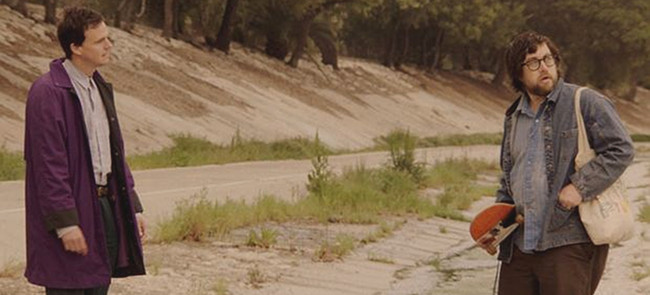 Packed with observations and witty references, this low-budget film blends comedy with pastiche horror. The dialog has rambling deadpan charm, as if everyone is simply trying not to sound as stupid as they are. Actor-filmmakers Clay Tatum and Whitmer Thomas infuse everything with a wry sense of humour that's goofy but has just a hint of edge to it. So while it's a bit meandering, it's also engaging. Struggling to make a living as a photographer, Clay (Tatum) has little motivation, but his wife Whitney (Weir) encourages him to take control of his career. While she's out of town, he fills his days with little scams and heads out to shoot some photos. On one of these excursions, he runs into his old friend Whit (Thomas), and they decide to hang out. Then Whit confesses that he thinks he's a ghost, and Clay is the only person who can see him. Feeling haunted, Clay tries to escape Whit's presence before Whitney comes home. Frequent scenes involve people who think they see or hear someone lurking around them, and the irony is that only Clay can see Whit. Even before they run into each other, Clay is so unnerved staying home alone that he sleeps in the living room. So he's even more freaked out by the thought that he might have some sort of gift for seeing dead people. This leads to a series of mini-adventures, such as gaining advantage at a poker game. But since Whit can only interact with Clay, he becomes a stalker, refusing to go away, which begins to feel chilling on multiple levels. Performances are offhanded, creating a snappy improvisational tone as these bumbling characters try to cope with the pressures of real life as well as this extraordinary situation. Tatum is a likeable sad sack who has given himself an awful haircut. His awkward interaction with the equally off-kilter Thomas is amusingly messy, largely because Whit seems unable to think in tangible ways. Their getaway to the mountains is amusingly absurd. The story moves at a very slow pace, with only rare flashes of energy. So most of the movie feels rather mopey or aimless, like the two central figures. Offbeat touches continually underscore the ways these characters try to keep their morale up while the world is knocking them down. The way White longs to be seen adds a kick of resonant satire. And the ending carries a surprisingly vicious sting.
| ||||||||||||||||||||
|
He Went That Way Review by Rich Cline | 
| 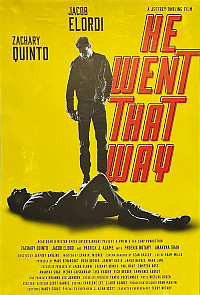 dir Jeffrey Darling scr Evan M Wiener prd Marc Benardout, Hugh Broder, Jeremy L Kotin, James Harris, Mark Lane with Jacob Elordi, Zachary Quinto, Patrick J Adams, Phoenix Notary, Ananyaa Shah, Alexandra Doke, Nicolette Doke, Troy Evans, Christopher Guyton, Roman Arabia, Josh Archer, Denise Sante release UK 12.Jan.24 23/US 1h35 Is it streaming?
| 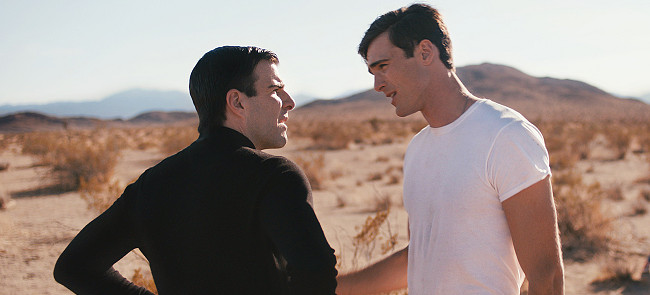 With a coiled nervous energy, this Route 66 road movie keeps the audience on edge about what might happen next. This is largely due to the interaction between a loose-cannon nutcase and a mild-mannered nerd. Based on a true story, the plot's aimless sensibility sometimes feels rather unfocussed, but there's plenty going on under the surface. And director Jeffrey Darling makes the most of the expansive desert setting. In the summer of 1964, live-wire Bobby (Elordi) is hitchhiking across the American southwest when he gets a lift from the soft-spoken Jim (Quinto), who is heading to Chicago accompanying the celebrity chimp Spanky (performed by Notary). Each day, Jim checks in with his pushy wife Esther (Sante) on the phone, and he stops along the way with his desert-dwelling priest brother-in-law Saul (Adams), which doesn't go well. Meanwhile, the various encounters along the way create a wary friendship between Bobby and Jim. But the tension begins to grow as they get closer to Chicago. From a flash-forward opening, it's immediately apparent that Bobby is a psychopathic killer. And this is reenforced by his mercurial behaviour plus a few murderous flashbacks. Despite his straight-arrow demeanour, Jim has a steely side that's equally unpredictable. So the adventure they embark on together is jagged and often startling. As they meet an offbeat collection of people along the road, it's enjoyable to wonder about the direction things might take. Oddly, the script strains to make Bobby a likeable charmer, despite revealing his murderous impulses. Elordi's charisma and lanky physicality also add an intriguing energy to the wildly opportunistic Bobby. By contrast, Quinto gives Jim an awkward, earnest timidity that clearly hides a tightly wound persona. So as Bobby pushes Jim's boundaries, the actors are able to tap into some some depth of character in ways that are sometimes engaging, but often darkly chilling. And the way Bobby, Jim and Spanky bond always feels somewhat precarious. In Bobby's mind, his only problem is with people who lie to him. But then his mind isn't exactly stable. And instead of fighting with him, Jim continually offers helpful advice. It's not exactly the case that Jim's decency calms Bobby's inner beast, or that Bobby loosens Jim's reserve. There's an element of this, although there's also the sense that something entirely different is actually going on here, which keeps us at arm's length right to the offbeat epilogue.
|
| You Can’t Stay Here Review by Rich Cline | 
| 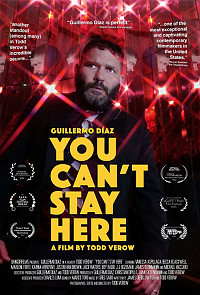 dir Todd Verow scr James Derek Dwyer, Todd Verow prd Guillermo Diaz, Christian DiPillo, James Kleinmann, Todd Verow with Guillermo Diaz, Justin Ivan Brown, Vanessa Aspillaga, Becca Blackwell, Marlene Forte, Jack Waters, Karina Arroyave, Andrew LaFerrera, JJ Bozeman, Boy Radio, Michael Vaccaro, James Kleinmann release US 5.Jan.24 23/US 1h44 Is it streaming?
| 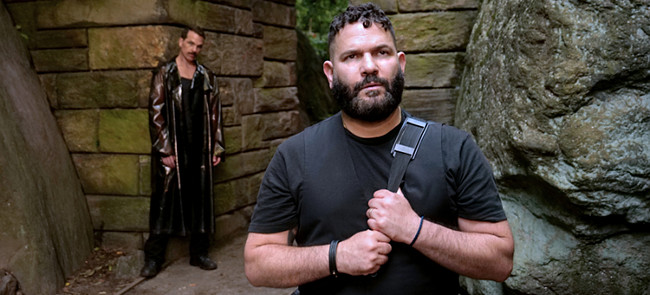 Inspired by actual events, this film has a loose but hyper-real style that echoes the guerrilla shooting vibe of Bruce LaBruce. Filmmaker Todd Verow heightens the story with offbeat cutaways and dark emotions. Even if the low budget is apparent, the film is strikingly shot with cameras that glide along with the characters. And the plot works on some haunting levels, touching meaningfully on issues like loneliness and voyeurism. In 1993 New York, photographer Rick (Diaz) is snapping photos in a cruisy corner of Central Park while he makes connections with various men. But he remains timid about sex. When he develops the photos, he sees a menacing guy (Brown) in a black plastic trenchcoat lurking in the background. And when men start being murdered, Rick looks closer, and the man confronts him at knife-point. Rick finds this both scary and exciting, so the escalating situation begins to take over his life, sparking his imagination in ways that are both frightening and emboldening. Verbose but soft-spoken narration reveals Rick's thought process, echoed in flashbacks to him reading the Orpheus myth to his young son (LaFerrera) before his wife (Arroyave) catches him with a man. He also recounts a gentle history of the difficulty of finding love for a gay man in the Aids-era. And now he's dealing with an annoying boss (Aspillaga) and his dementia-impaired homophobic mother (Forte), while these mysterious murders understandably spark freaky nightmares. Diaz plays Rick as a deep thinker who has taken a few knock-backs and is struggling to live in-person rather than through his camera lens. So it's easy to understand why he feels both terrified of and drawn to this killer, someone who notices him. Diaz's on-screen connection with Brown is intense and complex, playing out largely in dream sequences that are nasty and also cleverly tricky to distinguish from Rick's waking life. The only other person Rick properly interacts with is Hale (Blackwell), a sketchy but friendly man he befriends in the cruising area. Intriguingly blending echoes of Antonioni's Blow Up with Friedkin's Cruising, the story evolves through scenes that are emotional and unnerving, shifting between a thriller and a quirky satire about both gay life and the art scene. And there are knowing comments about the nature of cruising, especially at a perilous time when there was no other way for gay men to meet each other. So even if the final act meanders a bit, there are strongly resonant undercurrents.
| 
See also: SHADOWS FILM FESTIVAL © 2024 by Rich Cline, Shadows
on the Wall
HOME | REVIEWS | NEWS | FESTIVAL | AWARDS
| Q&A | ABOUT | TALKBACK | | |||||||||||||
